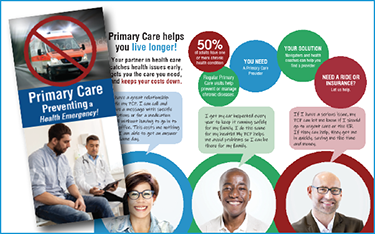
What should you ask your PCP?
A check-up can be confusing for some people. It does not have to be that way. Don't be afraid to ask your PCP questions to help you understand your health issue. Your PCP is there to help you become healthier. He or she will help you to get the support and treatment you need.
Bring all your current medications or prescriptions including herbal remedies and OTC drugs with you when you visit your PCP. This is especially important if you have been treated by other doctors to prevent harmful interactions between medicines.
Here is a list of questions to help you start:
- What do you call my health problem?
- Did I tell you of all the things I am doing or taking to help me feel better?
- What do I have to do to feel better?
- What could happen if I don't do what you suggest?
- When should I return?
- Do I need to see any other doctors?
- What medicine do I need to take?
- How will it make me feel?
- How do I take it?
- Do I still take my other medicines?
Bring this helpful brochure to your doctor visit to make sure you have the information you need when you leave.
Talk with you Primary Care Doctor about screening tests to detect problems before they become emergencies. See Staying Healthy at Any Age for a guide to screening tests recommended for your age and gender.
Having one primary care doctor is the best way to manage your health. This ensures you get care from a doctor who knows all your health issues and reduces the risk of repeat tests and conflicting prescriptions. Once you find a PCP that you and your family are comfortable with, it is best to stick with him or her. For a list of providers near you, click here.
Why should I bother with a well visit?
Regular check-ups help you to prevent your health issues from becoming health emergencies. Your PCP knows which shots will prevent health problems from happening. He or she can schedule tests such as PAP smears or other screens which detect cancer early. Some tests can be done right there in the office and you get the results at the same time. The well visit gives your PCP a chance to know you and to catch your health problems early. Some employers encourage their workers to get regular check-ups too.
How can a Primary Care Provider (PCP) help me?
Your primary care doctor knows your health history, medications and things about your life that can be important in helping you get healthy faster. He or she finds the services or specialists you may need to get the best care for your health problems. Health crises are expensive to treat. Regular visits to a PCP doctor cost less than a visit to the Emergency Department.
What else does a Primary Care Provider do besides treating me if I am sick?
- Coordinate visits with a health educator or nursing service.
- Monitor your medicines to see if they are working for you.
- Schedule your lab tests.
- Educate you and your family about your health issues.
- Determine which shots are best for you.
- Assists you with locating a dietician.
- Encourages you to take the best care of yourself.
When should I go the emergency room?
Call your PCP for advice if you don’t feel well. If he or she is not available, go to the nearest urgent care center or emergency room. A real emergency is a condition that comes on suddenly and is severe enough to cause harm. Call 911 or go to the nearest ER if you feel this way.
COVID19 Resources 2020



